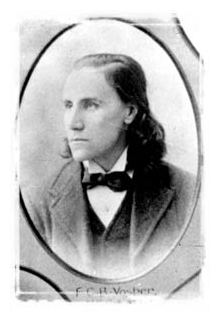 |
Frederick Vosper (1869-1901)
 Frederick
Charles Burleigh Vosper was a radical and vitriolic newspaper editor who
played a prominent part in the Western Australian Federation Movement. Frederick
Charles Burleigh Vosper was a radical and vitriolic newspaper editor who
played a prominent part in the Western Australian Federation Movement.
A passionate believer in trade unionism, republicanism and a white Australia,
he represented the miners of the Kalgoorlie Goldfields in State Parliament.
A popular, charismatic figure and a fiery public speaker, Vosper was tall
and thin with black, shoulder-length hair, a prominent jaw and a sallow
complexion.
Born at St Dominic Cornwall on 23 March 1869, Vosper migrated to Australia
in 1886. On arriving at Charters Towers in the north Queensland goldfields
he took up a career in journalism at the Northern Miner where he developed
a reputation as a radical journalist with a fiery, flamboyant public speaking
style and a strong sympathy for trade unionism. By 1890 he had become the
editor of the Australian Republican, the organ of the Australian Republican
Association. Vosper was acquitted of two charges of seditious libel following
his Bread or Blood editorial in which he condoned revolution during the
1891 shearers' strike. The following year he was imprisoned for three months
for inciting a riot during a miners' strike.
Vosper became editor of the Coolgardie Miner (1894-97). The newspaper was
a mouthpiece for his views on republicanism, opposition to Asian immigrants,
justice for the working man and a whole range of local issues, such as miners'
rights. He also argued for electoral redistribution to give the goldfields
a fairer representation in Western Australias Parliament. After unsuccessful
negotiations with the Political Labor Party he ran as an Independent for
the Legislative Assembly seat of North-East Coolgardie in the election of
1897. Moving to Perth to sit in Parliament, Vosper helped establish the
Sunday Times, becoming editor after the death of his partner Edward Ellis
in 1898. While in Parliament he supported issues such as votes for women,
a minimum wage, compulsory arbitration, penal reform and reform of the Lunacy
Act.
By 1900 Vosper had come to oppose Federation on the terms being offered
and actually campaigned for a 'No' vote. Many of his goldfields' colleagues
denounced him, but his anxiety and passionate belief in Federation is evident
in his letter to John Kirwan of 6 May 1899 in which he states that,
"In keeping silence in the Miner you have done me great
service, in other words trusted me - which is the greatest and best of
all kindnesses. I can quite understand your surprise at my attitude although
you will remember that I have always insisted on a transcontinental line
as a vitally necessary concomitant of federation. Nevertheless I was and
am prepared to accept federation at a sacrifice, if need be. But I have
been alarmed by the proposal already made to run the line from Sydney
to Port Darwin. If that is done before the Fremantle-Augusta line is built
our isolation and consequent fossilisation under federation will be worse
than it is today. And upon the removal of this isolation our commercial
progress and political enfranchisement depends. I am not disputing federation
- far from it - but the Pt Darwin railway. I want to make plain to WA
people what we are likely to lose by it and also to show the eastern leaders
that if this project is persevered in it will only be at the cost of alienating
WA. Of course we know that if we keep out of federation the Pt Darwin
line will be built, but we want to get federation plus our railway. The
two must come together for either to be effective. Now as to whether my
action will wreck federation in this colony I contend that inside a month
it will be recognized what I have done is much if not more than anyone
else to promote it ...
All of this we can't explain to the public; but you will understand
me better for the explanation. I am playing a big game; and if my friends
on the fields will but suspend their judgement for a while success will
justify me." [Battye Library, Acc383A]
After the success of the referendum Vosper nominated as a candidate for the Senate as a free-trade liberal. But on the 6 January 1901, just five days after the Commonwealth of Australia came into existence, he collapsed and died from an attack of appendicitis at the age of thirty one.
|
 |